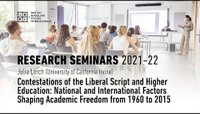Research Seminar | Contestations of the Liberal Script and Higher Education: National and International Factors Shaping Academic Freedom from 1960 to 2015
Julia Lerch (University of California Irvine). Chair: Juliette Crespin-Boucaud (IBEI)
Available in video:
We examine cross-national and longitudinal variation in academic freedom from 1960-2015 for a large sample of countries. Academic freedom provides a lens into the historical evolution of university and scientific authority relative to other institutions – originally religious authorities, but now primarily the state. We situate this evolution in a global context and argue that patterns of academic freedom reflect not only national contexts but also broader shifts in global institutional structures and countries’ linkages to these structures. We delineate relevant global shifts, beginning with the rise of liberal international institutions after World War II, along with institutionalized oppositions such as the communist Warsaw Pact. The post-1945 liberal institutions rested heavily on universalistic ideas of science and education as solutions to problems of international cooperation and development. In this context, universities and academic freedom diffused in many parts of the globe. The communists embraced many parts of the university, but with much greater state control. The demise of communism unleashed a burst of democratization and universities expanded in size and influence, boosting academic freedom. In recent years, however, liberal norms appear to be increasingly contested. Far-right nationalist and populist movements have surged, opposition to liberal international institutions has grown, and democracy is on the decline. These oppositions again provide a basis for criticism of universities and science, curtailing academic freedom. Statistical analyses find that state characteristics, such as democracy, civil war, and state religion affect academic freedom. However, we also find evidence for the influence of global factors. Country embeddedness in liberal international institutions tends to increase academic freedom, whereas linkages to international organizations that legitimate illiberal alternatives tend to decrease it.
Julia Lerch's work examines educational change in a global context. She is particularly interested in understanding large-scale (and often global) shifts in the kinds of social goals that schools and universities are expected to advance. For example, a recent project has focused on the growing institutionalization of education as a core pillar of international responses to humanitarian emergencies, such as refugee crises. She explored how this shift not only broadened the boundaries of humanitarian aid – historically focused on survival – but also expanded the goals of education, which now span from long-term development to emergency relief. In a second line of research, she has studied shifting portrayals of society in educational curricula worldwide, using data coded from school textbooks on topics such as nationalism, diversity, and human rights, as well as internationalized study programs at universities. In addition to these lines of work, she is currently involved in a research effort to understand ongoing contestations over the institutions promoted by the post-World War II liberal international order, with particular focus on universities. You can view publications from these projects here.
Co-organized by IBEI and ETHNICGOODS



